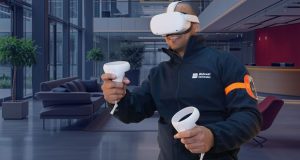 Steve McGregor, Group Managing Director, DMA Group argues why apprenticeships are the best route to upskilling the workforce
Steve McGregor, Group Managing Director, DMA Group argues why apprenticeships are the best route to upskilling the workforce
As a sector, we are facing a two-pronged human resourcing challenge. First is a matter of raw numbers. The facilities management and hospitality trades face an acute skills shortage that has only been exacerbated by the COVID pandemic. We suffered some of the most prolonged closures during the lockdown periods, which understandably left employees and colleagues questioning the stability and viability of enjoying a long-term career in the sector.
COVID also accelerated another trend – the need for digital skills. FM and building management tech were already steadily maturing prior to 2020. Now, with enterprises increasingly going down the hybrid working route, our service provision must also keep up and provide what is needed to make the workplace function effectively in the so-called new normal.
Once again, we are not immune in facing a digital skills gap – just 38 per cent of UK employers say they have all the skills they need to meet their business objectives.
DIFFERENT APPROACH
Younger generations of employee are critical to addressing these challenges. Unless this group of people are attracted in volume to FM from schools, colleges and universities we will not see a step change in the quality of what we do, while our ability to provide any level of services could well be hindered into the future.
To encourage more apprentices into our workforce and best exploit their talents, a fresh approach to the traditional trade apprenticeship model should be considered.
At DMA Group, we’re extremely proud of what we are building with our apprenticeship scheme. We have taken on more trade apprentices, and they will follow the conventional multi-year model that combines on-the-job work experience with our qualified engineers alongside day-release for college-based work.
However, we realise the need to go further and offer more. Currently, we are looking at ways to break the mould by following a newly devised and implemented guided development model. This style of apprenticeship will seek to develop not only chosen trade careers and individual personal development but may also extend apprentices’ exposure to different functions within our business, offering them the opportunities to develop and become multi-skilled.
The idea is to take the best of the trade apprenticeship model and also hone a wider range of skills that can help apprentices to advance their way up through the sector, whether that is within our business or elsewhere.
We can already take inspiration from our current senior leadership team, which is enriched by many people who followed a trade-based apprenticeship. These experiences are deeply embedded with each person because they were very well-structured programmes over three or four years – we will be seeking to develop a skills development programme that creates real life chances for real people.
One of DMA Group’s apprentices won Asian Apprentice of the Year during his training and is still working within the business in a full-time qualified position. Through our guided development approach, we hope to inspire more of these stories and upskill a generation into long-lasting, meaningful employment.
CREATING A TRUE CAREER PATH
Demonstrating that we can provide genuine career-building opportunities is critical to attracting more young people into the FM and FM tech workforce.
As well as offering a more diverse skills development pathway that opens doors into leadership positions, we need to do a much better job of positioning the sector as a forum through which people can become digital pioneers.
How can we bring our industry into the 21st century and make it attractive to the digitally-savvy young engineer just starting out in the working world? While it is widely accepted that, on a broad basis, the industry needs to embrace technology at a much greater rate, new digital frontiers are opening up in this space and we need to push that harder. Buildings and the way they can be managed are becoming smarter all the time, with a clear pathway to a ‘smart building’ via BIM and other technologies already established.
There is also a compelling sustainability case we can make to younger generations. Net zero by 2050 will not be achieved unless our current building stock is decarbonised – the facilities management sector has an enormous role to play in this journey by embracing smarter ways of operating buildings that will drive the required energy and resource efficiencies.
Another key factor on which our ability to solve the skills shortage problem hinges is attracting more women into facilities management. We recently took on our first female engineering apprentice – the more role models we can nurture and send into schools, the greater our chance of closing the gender gap and bolstering the skills base.
The sector appears to be trending in the right direction. According to a survey conducted by the Institute of Workplace and Facilities Management (IWFM), the male-to-female ratio in FM careers in the UK shifted from 68-32 per cent split in 2020 to 66-34 per cent in 2021.
However, the gap is still far too wide, and we must do more to build a more gender-balanced workforce which will not only help address our skills shortage, but also create a more diverse and equitable workplace.





